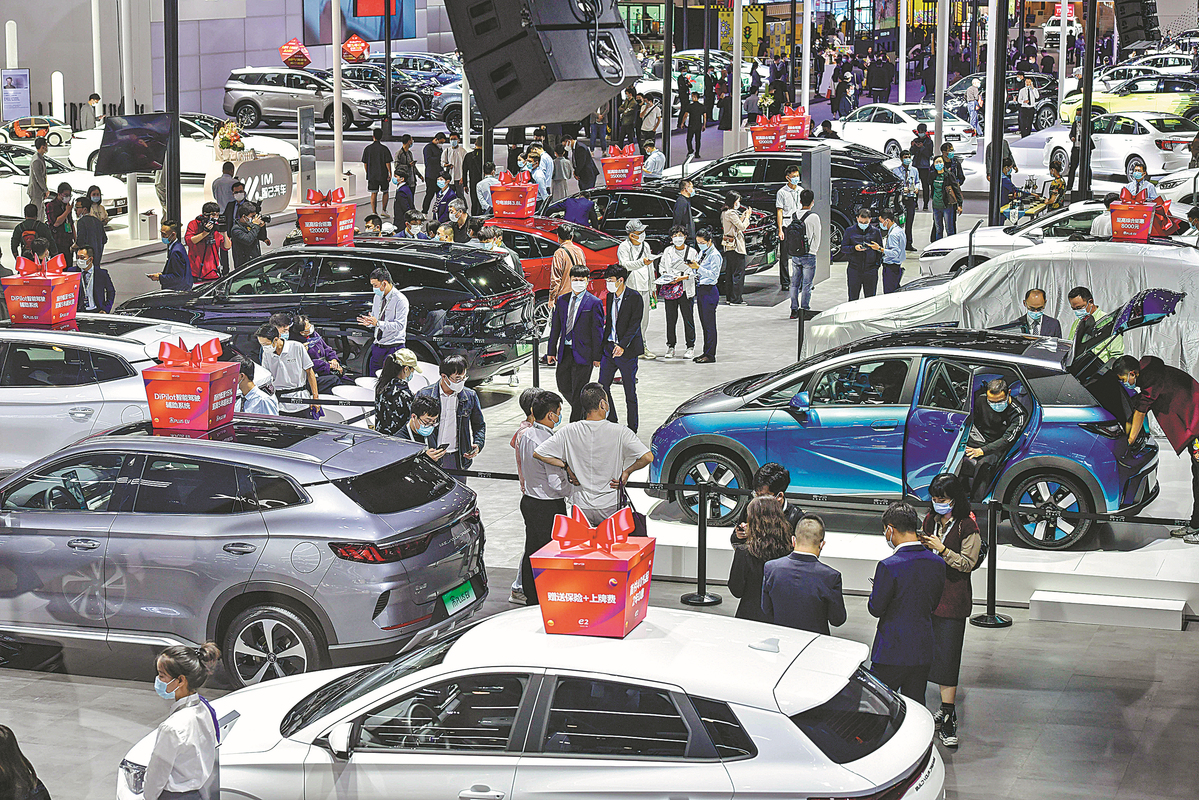Policies on way to help people buy new cars

Motor industry resumes manufacturing and staying positive after COVID-19 outbreaks
China is rolling out policies to stimulate car sales as carmakers gradually rev up production which was affected by COVID-19 outbreaks earlier this year.
The State Council, China's cabinet, is planning to relieve car buyers of vehicle purchase taxes worth 60 billion yuan ($8.99 billion). Analysts said it will prove to be a great boost to the pandemic-hit Chinese car market.
The State Council announced the decision last week as part of a package of measures to stabilize economic performance. But it is yet to release details such as when it will be put in place and what vehicles will be covered.
The 60-billion-yuan relief would account for roughly 17 percent of vehicle purchase taxes levied in 2021, according to Ping An Securities.
Carmakers, including Dongfeng Peugeot Citroen Automotive, said they welcome the policy but they hope the details are announced soon to counter customers' wait-and-see attitude.
Cui Dongshu, secretary-general of the China Passenger Car Association, said the measure is likely to target gasoline-powered passenger vehicles. Electric cars and plug-in hybrids are now exempt from purchase tax, which stands at 10 percent of a vehicle's price.
He said the move will be "a strong impetus" to the passenger car market which saw an 11.9 percent drop year-on-year from January to April.
In April, the drop was as much as 35.5 percent to 1.04 million units. Plant stoppages and dealership closures were all due to COVID-19 outbreaks.
Almost all carmakers in China saw their production and sales fall last month year-on-year, which was the worst April in a decade.
As plants are now resuming operations to produce vehicles, the measure that is expected to stimulate consumption will have a great role to play in boosting vehicle sales.
China rolled out similar measures in 2009 and 2015, which halved the purchase tax on passenger vehicles with engines no bigger than 1.6 liters. On both occasions it worked to invigorate the car market.
Lang Xuehong, deputy secretary-general of the China Auto Dealers Association, said the measure should be put in place as soon as possible.
"The 60-billion-yuan tax relief can be focused on purchases in the second half of the year. It could drive the growth rate of passenger vehicle sales this year to up to 10 percent from 2021," said Lang.
From January to April, CADA retail sales of passenger vehicles totaled 5.96 million units, down 11.9 percent year-on-year, or 800,000 units less from the same period in 2021.
Local governments in provinces including Shandong and Hubei have released policies to stimulate vehicle sales.
In Hubei, those who buy vehicles in the second half of this year are eligible for subsidies worth up to 8,000 yuan.
In Shandong, they can receive coupons worth up to 6,000 yuan if they buy from now to the end of June.
Meanwhile, in Shenzhen, a major city in South China's Guangdong province, authorities are offering subsidies worth up to 10,000 yuan for those who buy new energy vehicles. They are also issuing another 20,000 license plates for such vehicles this year on top of the current quota.
Earlier this year, the State Council asked local authorities to assist purchases of vehicles, especially new energy ones, which have been a driving force of the vehicle market.
Local governments shall not put in place new measures that curb vehicle purchases and those who have done so shall gradually scale up license plate quotas, said the State Council.
Zhang Xiang, a researcher at North China University of Technology in Beijing, said a larger quota of license plates will help drive up vehicle sales, especially in big cities.
Guangzhou, capital of Guangdong, is increasing its quota by 20,000 license plates as well.
The China Association of Automobile Manufacturers is confident in the prospects of the NEV segment.
Earlier this year, it estimated that deliveries could reach 5 million units for 2022, up from 3.5 million units from 2021.
The association is soon expected to launch a campaign that promotes NEVs in China's vast countryside.
As for the overall market, Chen Shihua, deputy secretary-general of the CAAM, said the auto industry is showing signs of recovery. Carmakers are scaling up their production to make up for the losses in April caused by the pandemic and to launch new models to woo back car buyers, he added.
"We are confident that the auto sector will reach the year's growth goal and thus contribute to China's macroeconomic growth," Chen added.
The association estimated earlier this year that sales would grow to 27.5 million vehicles this year, up 5 percent from 2021.

